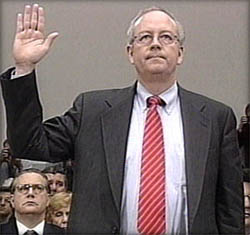 I wonder who's really paying the tab for this. Maybe a discretionary grant from ED?:
I wonder who's really paying the tab for this. Maybe a discretionary grant from ED?:
JUNEAU, Alaska (AP) -- Former Whitewater special counsel Kenneth Starr petitioned the U.S. Supreme Court to take up Alaska's "Bong Hits 4 Jesus" case, a dispute involving a high school student, a banner and a tough school policy.
Starr, who gained national prominence while investigating former President Clinton's Whitewater land deal and relationship with Monica Lewinsky, filed the petition Monday on behalf of the Juneau School District in response to a March ruling by the 9th U.S. Circuit Court of Appeals.
The appeals court sided with a high school student who displayed a banner reading "Bong Hits 4 Jesus" during an Olympic torch relay in 2002. It ruled former Juneau-Douglas High School principal Deborah Morse violated former student Joseph Frederick's free speech rights.
The U.S. Supreme Court petition must receive a minimum of four of the nine justices' votes to be heard.
Frederick, then a senior, was off school property when he hoisted the banner but was suspended for violating the school's policy of promoting illegal substances at a school-sanctioned event.
"The principal's actions were so outrageous, basically leaving school grounds and punishing a student for a message that is not damaging to the school," said his attorney, Doug Mertz.
Superintendent Peggy Cowan said clarification is needed on the rights of administrators when it comes to disciplinary action of students who break the district's drug message policy.
"The district's decision to move forward is not disrespectful to the First Amendment or the rights of students," she said. "This is an important question about how the First Amendment applies to pro-drug messages in an educational setting."
Starr, of the Los Angeles-based firm Kirkland & Ellis, took the case pro bono.
The outcome could have implications on how student-conduct policies are enforced around the nation, said Eric Hagen, one of two other attorneys from Starr's office named on the petition.
"It makes it a little harder when teachers and principals in their daily duties might be subject to a damages lawsuit and be held personally liable," Hagen said.
No comments:
Post a Comment